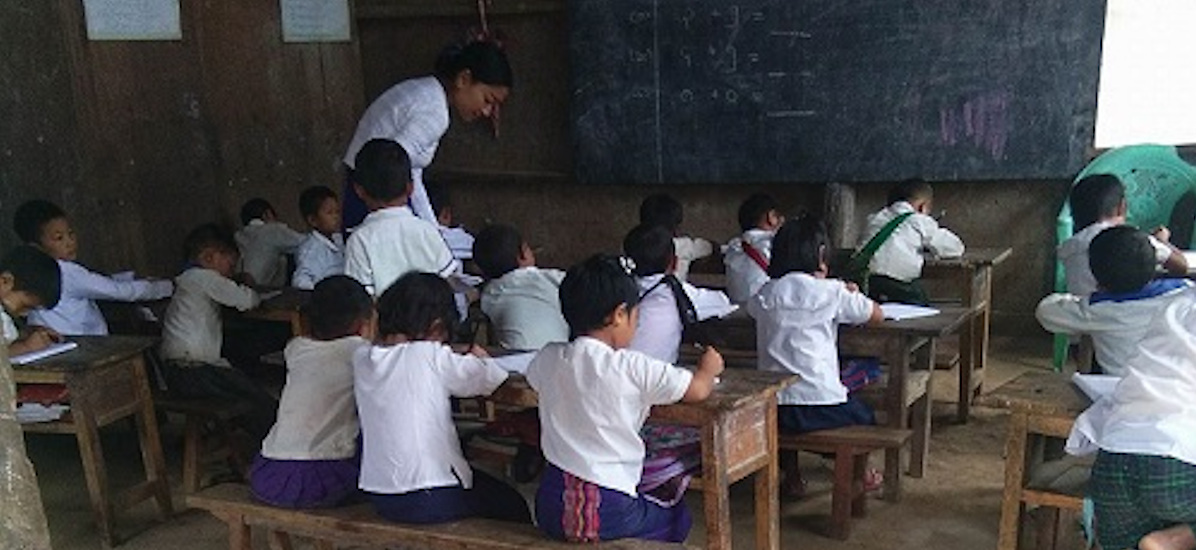
Ja Aung, a young woman from Myanmar, serves as a volunteer teacher in a school in Kachin State located in a non-government controlled area (NGCA). She is herself an Internally Displaced Person (IDP); she had to leave her hometown because of conflict and find a place of refuge in another city.
Ja Aung teaches mathematics to students in three different grade levels. She began teaching two years ago after graduating from a Jesuit Refugee Service (JRS)-supported teacher training course.
“I found happiness in teaching as I can share my knowledge to children who are starving for education, especially when I see the smiles on the students’ faces when they are learning in the classrooms. I want to improve my teaching skills as much as I can.”
At the beginning of her assignment, she faced multiple challenges. The biggest challenge, Ja Aung says, was communication. “The school is situated on the border between China and Myanmar where students speak different Kachin dialects. I adjusted by listening attentively and then learned the language from the children and other teachers.”
Another challenge is the small stipend for the volunteer teachers. Ja Aung says, “The pay is difficult to live on, especially because there is high inflation and a huge difference in the value of Myanmar kyats and Chinese yuan. Without the generous support from the community–particularly the students’ parents–decent daily meals cannot be secured.”
During the year, Ja Aung built close relationships with her students but also with the other teachers, the parents and the IDP community of the camp. “Students’ parents and people from IDP camp were friendly. Sometimes, they came and visited the teachers, asking me if I was going to continue teaching here next year. I am happy to teach. I am very proud that 80 per cent of my students passed the exam.”
According to Ja Aung, teachers are also facing the issue of the difference of curriculum between the schools in the IDP camp and in other parts of Myanmar. Moreover, the national government does not recognise the education provided by the schools in the NGCAs.
“In order to address the nationwide teachers’ shortage, as well as to promote mother-tongue based multilingual education, the Myanmar government should develop a policy and pathway for trained, experienced community teachers to become government recognised/certified teachers who can have careers in government schools,” says Ja Aung.
The DCE-JRS Teacher Training Course is currently running for the sixth batch of students since the programme began. The nine-month long teacher training programme provides skilled volunteer teachers, thereby promoting access to quality education for disadvantaged children in remote conflict-affected villages. In coordination with parishes, the Diocesan Commission for Education (DCE) recruits young people who would like to volunteer as teachers and provides training in coordination with JRS. The volunteers are then sent to IDP camps and remote conflict-affected villages.
“I am lucky that I received the teacher training organised by JRS and DCE Myitkyina. It helped me learn how to teach. When I first became a volunteer teacher, I was just 19. I was young and did not know much about life. Even though I was an IDP myself, my first year of voluntary service in the camp made me more concerned about the lives of the people in the camps and about the education of their children. It stimulated my willingness to teach in remote/conflict-affected areas. As a result, I decided to continue my service in the next academic year (2019-2020). I think that the school is needed to develop a country and to develop the students’ future.”
Ja Aung’s hard work has also been noticed by the headteacher of the school as she was chosen among the teachers to receive the role model award.
Over 97,000 people are displaced in Kachin State as a result of the armed conflict, remaining in camps or similar situations. Children make up at least 50 per cent of this population. Moreover, there are many remote and conflict-affected areas where children cannot enjoy access to education opportunities. This is the reason why JRS and its partners in Myanmar are putting education needs as a priority. [JRS Asia Pacific]

